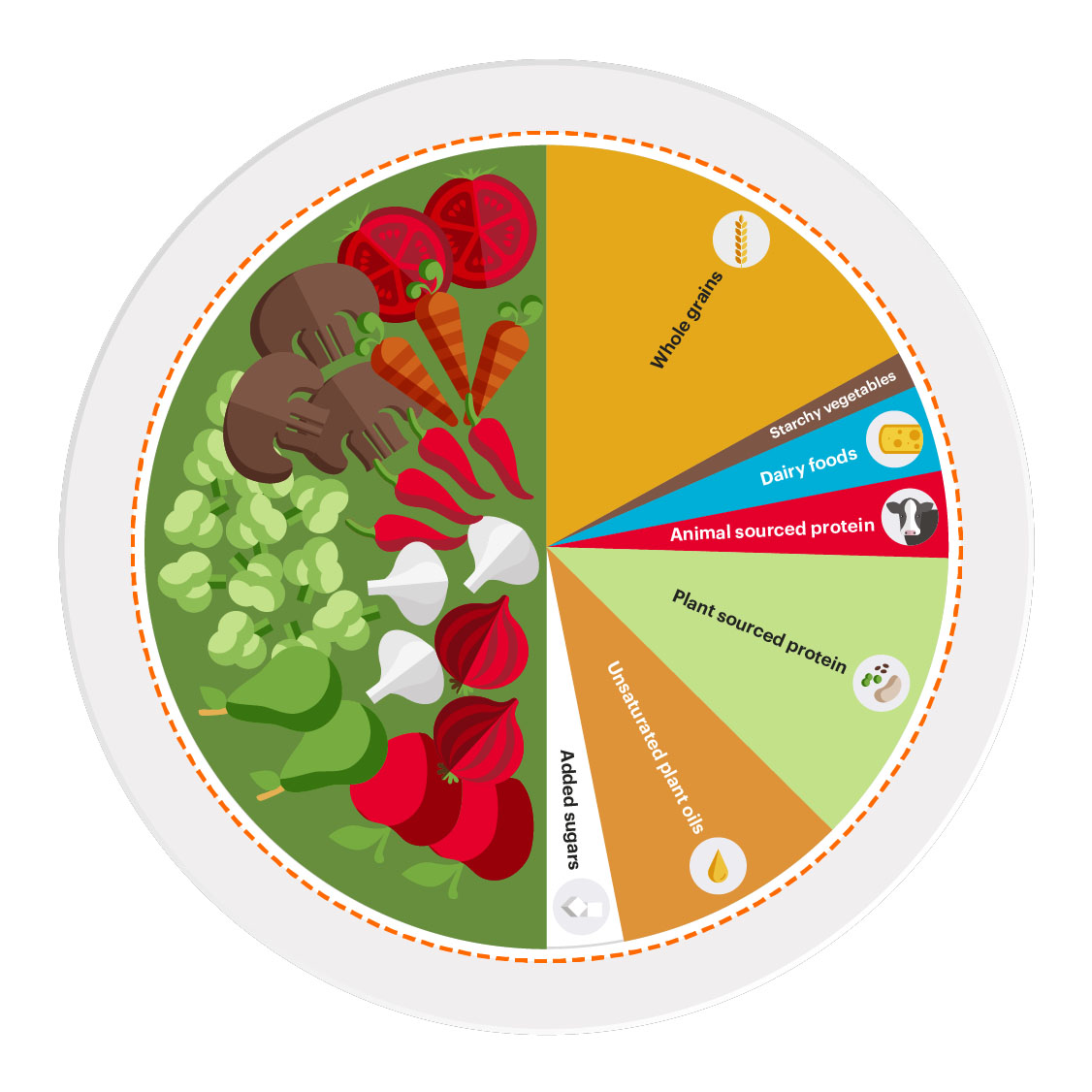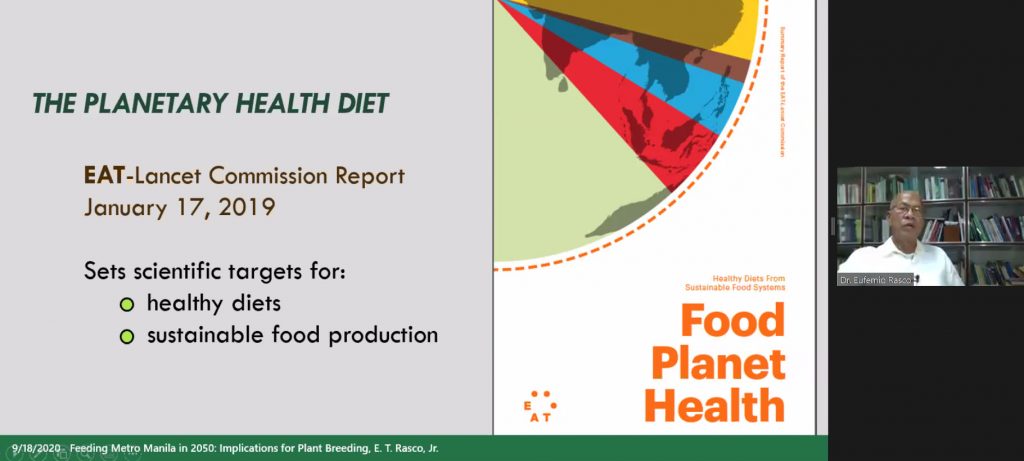
Are you ready to ditch being a meat-lover and become a plant-eating flexitarian in the future?
The EAT-Lancet Commission recommends converting the world’s middle and upper class to flexitarians (people who eat a plant-based diet) by 2050 to sustain the earth’s resources and keep the population healthy.
There are also plans of getting Manila dwellers to follow suit. Dr. Eufemio Rasco, Jr. of the Institute of Plant Breeding, University of the Philippines Los Baños shared this framework to “Feeding Manila in 2050” in a webinar last 18 September 2020.
He discussed the flexitarian EAT-Lancet Planetary Health Diet (PHD), the PHD app becoming mainstream in 2050, as well as its implications for plant breeding.

“To feed manila, we need to switch to a science-based diet — the planet-healthy diet or PHD,” said Dr. Rasco, Jr., the webinar’s main speaker.
Are we going to gradually say goodbye to dishes like scrumptious lechon, and in turn, to a huge part of our culture? More importantly, is its environmental impact worth the sacrifice? Comment below and let’s be a part of the global discussion.
The flexitarian diet (EAT-Lancet’s Planetary Health Diet)
PHD or the flexitarian diet is designed to keep us healthy and well-fed in an environmentally-sustainable way.
It focuses on regulating or influencing what we eat by encouraging the world to eat a more plant-based diet (50% plant-based) and produce more crops and vegetables with less poultry and livestock.
“Transformation to healthy diets by 2050 will require substantial dietary shifts. Global consumption of fruits, vegetables, nuts and legumes will have to double, and consumption of foods such as red meat and sugar will have to be reduced by more than 50%. A diet rich in plant-based foods and with fewer animal source foods confers both improved health and environmental benefits.” — Prof. Walter Willett, MD, Harvard T.H. Chan School of Public Health in the EAT-Lancet Report, 2019

One of the reasons for this shift is mainly because of how resource-intensive it is to produce animal-based food, as seen in the above WRI stats. To be environment-friendly, it is wise to consider consuming more produce that takes up less resources in the long run. But let’s still keep the discussion open to the possible ramifications in social and culinary culture, adoption and inclusive development.
Dr. Rasco, Jr. also said that food marketing will be more localized as a part of the PHD framework for Manila. Read about some ways to effectively sell online with marketing communication in my other article should you see this opportunity as a way to strengthen your business in the local food and health sector.
Challenges: the shift won’t be easy
I downloaded the PHD app that Dr. Rasco, Jr. said will be mainstream by 2050. It has a long way to go in terms of UX (user experience) design, so we’ll see how it improves down the line.
The sliders work, but it could be better. Also, it doesn’t show suggested dishes according to the adjusted food ratios. If the suggested meals could be based on where the user is located, that could be nifty.
Perhaps over time it will adapt and change, but right now its practical use even by early adopters is a long shot.
I rarely encounter anyone who watches what they eat by calorie counts. It seems puzzling as to how this diet regulation can be monitored on an individual level among the middle-upper class Manila community. So the discourse and debate on this should continue for affected consumers to gain more clarity and inclusiveness.
Another concern is affordability. As it is, dishes in a plant-based diet such as salads, quinoa, etc. are more expensive than the budget-friendly alternatives. In developed/emerged economies, this shift would be easier to implement. But in developing/emerging economies such as ours, the mountain to surpass would be gargantuan for this to really work.
Kudos to the government and private sector if we can somehow bring down the cost of plant-based food further. But otherwise, it is a definite obstacle to PHD implementation and adoption.
Culture is another factor. If I’m not mistaken, Filipino cuisine is usually highly animal-based (i.e. adobo, lengua, dinuguan, kare-kare, etc.).
Stripping that or drastically reducing animal meat in local cuisine could change local culture dramatically and cause quite a stir. Aside from human and planetary health, we also should be concerned about preserving cultural health/integrity as well — or at least how to manage it in the process.
EAT-Lancet’s flexitarian diet is not yet inclusive or viable for those in lower income brackets
With these concerns in mind, perhaps it is why the PHD campaign’s intended audience or market is the middle to upper class Filipinos in Manila. But then again, what about the lower income brackets? This defeats the purpose of inclusive and participatory development, which is to prioritize the poor.

Even then, the Filipino middle class still has trouble affording a healthier, organic, plant-based dietary lifestyle as it is. If so, only the upper class can really be the most active player in this campaign. It’s best to analyze scrupulously if taxpayers’ money will be spent appropriately on a campaign targeted only to a select few.
Considering that only the more elite tier of middle to upper class will be able to pull this off – will this flexitarian campaign really have a significant impact on emerging economies’ contribution to environmental (planetary) sustainability?
For a significant impact on our planet, shouldn’t all sectors of humanity (regardless of income bracket) be included in EAT-Lancet Commission’s long-term roadmap? Otherwise, we risk pouring resources into a program with very minimal impact on health and environmental sustainability.
In any case, perhaps the government should stick with its regulatory/governing function for this flexitarian shift. Let the private sector pull up its own resources to make this happen. That way, government resources can be better allocated for those in the lower income brackets – primarily the poorest of the poor.
How would this affect you?
With or without this flexitarian campaign, I already do what I can anyway to exercise and eat healthy. But to scrimp on animal-based food with no clear view of a significant eco-friendly impact — that sounds like a tall order at this point.
What about you? Comment below and let’s keep talking to see where this goes.
References:
